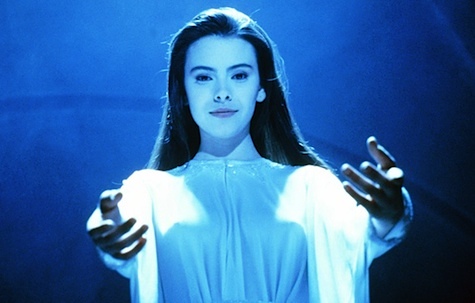If there is a human being alive who can summarize Lifeforce‘s plot—all the nude space vampires, exploding zombies, insane asylums, and wildly inappropriate behavior—with a straight face, it is likely that person has never smiled. Lifeforce is a wildly entertaining bit of insanity that bears less resemblance to typical genre films in terms of structure than it does Indian masala, a form in which as many wildly disparate elements are thrown together in one movie to the end of appealing to all possible audiences. The primary difference, of course, being that in Lifeforce instead of songs, there are nude scenes. That essential distinction aside, Lifeforce is still at least four different movies co-existing, with varying degrees of ease, as one. It is crazy, it is unique, and it is awesome.
Recently screened as part of Lincoln Center’s Midnight Movies series—running each Friday at midnight through the end of August; info on all the awesome movies they’re going to be showing here—Lifeforce is a slight rarity among the cult fare one generally associates with the “midnight movie” label, in that a considerable degree of its insanity seems to be on purpose. The authorial imprint of co-writer Dan O’Bannon can be felt throughout, with echoes of Dark Star and Alien, with the cracked humor of the former predominating over the genuine horror of the latter. And while director Tobe Hooper had some horrendous luck over the course of his career, he was nonetheless a skilled filmmaker with an inspired feel for genre. Lifeforce manages to at once visually reflect the handsomeness of its available resources ($25 million) and yet retain the charm of the micro-budget special effects movies of the 50s and early 60s that inspired it. It looks just as slick and just as trashy as it needs to to fulfill its needs as both a piece of cult insanity, and that thing on purpose.
The story (which I will try to relate through my giggling) begins with the discovery, within Halley’s Comet, of an apparently derelict alien spacecraft. A joint U.S./British space mission goes to explore, and finds a number of weird-looking desiccated corpses, and three nude humanoids (two male, one female), either asleep or dead, enclosed in space Lucite or something. Jump forward to a month later, and the spaceship is burnt to a crisp with no survivors other than the sleeping nude humanoids. The female (Mathilda May), proceeds to wreak absolute havoc—reducing people to just the kind of desiccated husks as populated the alien ship, with all manner of attendant blue light—all without the slightest bit of clothing on. This is important because she looks very good without clothes, and because all the men in the movie turn into absolute gibbering morons when they lay eyes on her; this is only natural, but it’s a good joke on the way bare breasts lobotomize the (straight) male brain.
While that covers the first two movies Lifeforce contains, the abandoned spacecraft SF movie and the sexy vampire run amok movie, it proceeds from that point through several more radically different movies, none of which are anything but delightfully insane (including one extended bit with a marvelously hammy pre-Jean-Luc Picard Patrick Stewart), all of which featuring the dynamic duo of elite SAS colonel Colin Caine (Peter Firth) and deeply troubled—and, conveniently for the amount of exposition it takes care of, newly psychic—American astronaut Tom Carlsen (Steve Railsback), who is inexorably drawn to the nude space vampire. As inevitably episodic as the movie ends up feeling, with its “and then this and then that and then the other thing” structure, Hooper keeps things moving at a crisp pace, with the deadpan humor never flagging. And at the end, it’s immensely satisfying: it’s almost impossible not to applaud Henry Mancini’s wildly dramatic score over the closing titles.
It would be a bit misleading, in strictly cinematic terms, to call Lifeforce “good.” But it would be just as misleading to call it anything but awesome. It’s one of the most gloriously apeshit pieces of cinema on record. And, in the midnight hour, when sanity is but a memory and sleep is somewhere past the horizon, it is one of the best traveling companions imaginable.
Danny Bowes is a New York City-based film critic and blogger.










